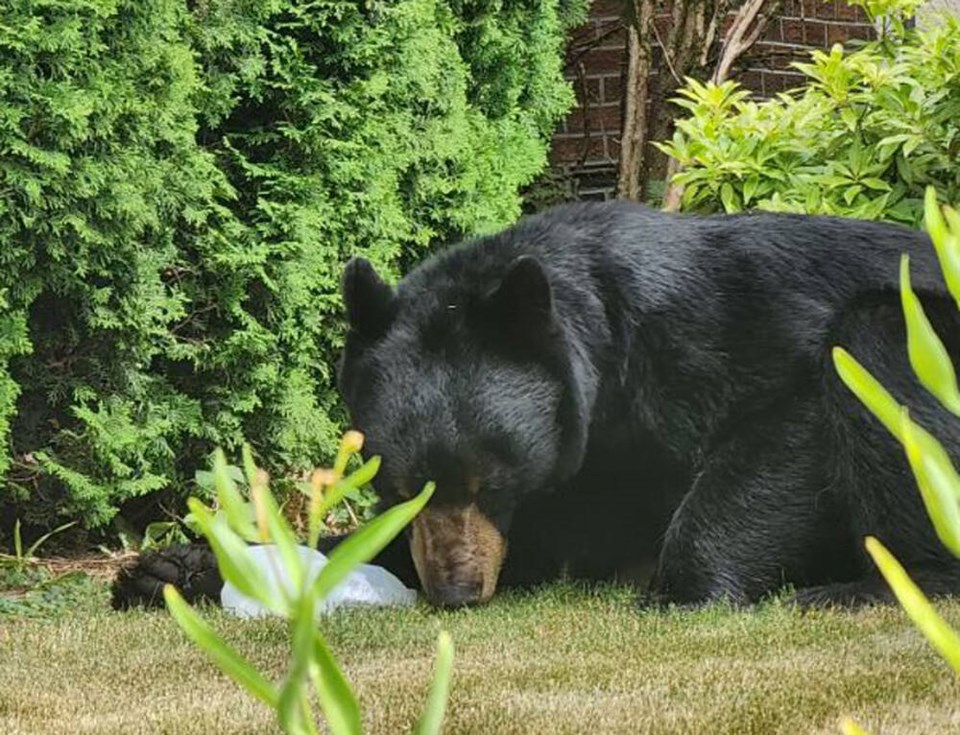District of North Vancouver council is urging civic leaders from around the province to ask for changes to the way black bear conflicts are handled, which they hope will result in fewer bears being killed by conservation officers.
Council voted Monday to request that the Union of B.C. Municipalities vote on a resolution at its annual convention this fall, which calls for independent oversight of B.C.’s Conservation Officer Service and for all orphaned black bear cubs to be taken to a wildlife sanctuary for assessment by a wildlife veterinarian.
Council voted on the issue Monday after hearing concerns about the record number of black bears shot by conservation officers in 2023. Concerns particularly centred on treatment of bear cubs, which wildlife advocates said are often not threats to people or posing any danger when they are killed.
According to wildlife advocate Ellie Lamb of the organization Pacific Wild, a record 603 black bears were shot by conservation officers in 2023, up from around 500 bears killed in 2022 and 2021. In contrast, only 26 bears were relocated, and 61 cubs were sent to wildlife rehabilitation centres, according to the organization, which pulled public statistics from the Ministry of Environment.
In a presentation to council Monday, Lamb said many bears that come into human neighbourhoods are simply seeking safety from dominant bears in other areas of the backcountry.
Lamb said her organization is calling for public oversight of the Conservation Officer Service, including an audit by the auditor general, a provision for body cameras to be worn by conservation officers and that all orphaned bear cubs be taken to wildlife rehab for assessment. She also questioned why conservation officers were carrying “military style” weapons in urban areas.
Lamb and other advocates who spoke to council Monday pointed to recent cases of orphaned bear cubs being killed by conservation officers near Comox on Vancouver Island and in Nelson.
“This is a great opportunity for the District of North Vancouver to be leaders,” said advocate Natasha Wehn. “We see ourselves as a place where nature is in our backyard,” she said. “But sometimes forget how to deal with it when nature enters our backyards.”
District resident Maureen Fielding said she’d like to see the municipality get tougher with fining people who don’t take care of their garbage and bear attractants. “There’s a lot of people in our neighbourhood who are not taking care,” she said, adding, “You can see all the rubbish all over the road.”
Fielding said the Conservation Officer Service seems to think of bears as dangerous regardless of what they are doing. “We don’t see swat teams coming out to blast away raccoons,” she added.
Councillor Herman Mah questioned how asking conservation officers to wear body cameras would improve the situation.
“Conservation officers are there to protect us,” he said. “I can just imagine how tough their position is.”
Coun. Jim Hanson asked how many black bears were killed on the North Shore last year.
Christine Miller of the North Shore Black Bear Society said two black bears were shot in West Vancouver in 2023 after entering multiple homes. Four other bears were euthanized because they were sick or injured, she said. One bear cub was taken to Critter Care in Langley.
According to information from B.C.’s Conservation Officer Service, no bear cubs were killed in North Vancouver last year.
"If orphaned bear cubs are approved as candidates for rearing and release, the Conservation Officer Service will help facilitate these efforts," the service said in an emailed statement.
"Once bears are conditioned to non-natural foods, and show a minimal fear of people, they are no longer candidates for relocation or rehabilitation, as the risk to public safety is too great," the service said in the statement.
"Conservation officers follow procedures outlined by wildlife biologists and the BC provincial wildlife veterinarian," the service added.
According to WildSafeBC, garbage and fruit trees are the most common bear attractants in the province, along with compost and bird feeders.
Last year, conservation officers responded to 27,356 calls about black bears, according to statistics from the Ministry of Environment.
Mayor Mike Little said in some cases, taking bear cubs to rehabilitation centres could prove impractical, especially in areas of the province that are more remote.
Coun. Catherine Pope said she liked the idea of getting tougher with fines for those who put out garbage early.
“I do believe that ultimately humans are responsible for bears and cubs losing their lives,” she said.
Pope added she didn’t think conservation officers themselves – most of whom also love animals – should be blamed for killing bears. “It’s the policy above that needs to be fixed,” she said.
Editor's note: this story has been amended since first posting to include a statement from the Conservation Officer Service emailed after press time.





